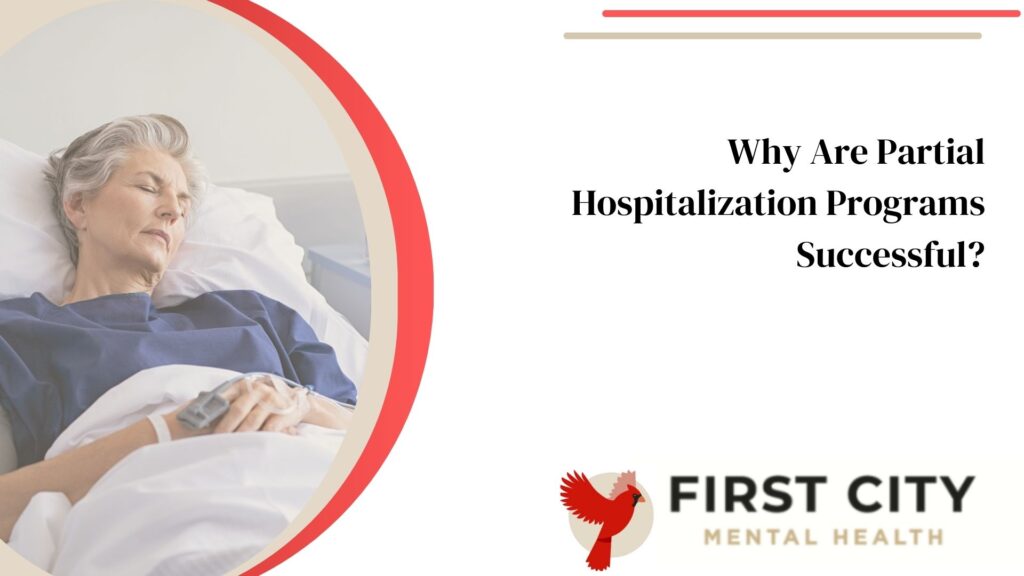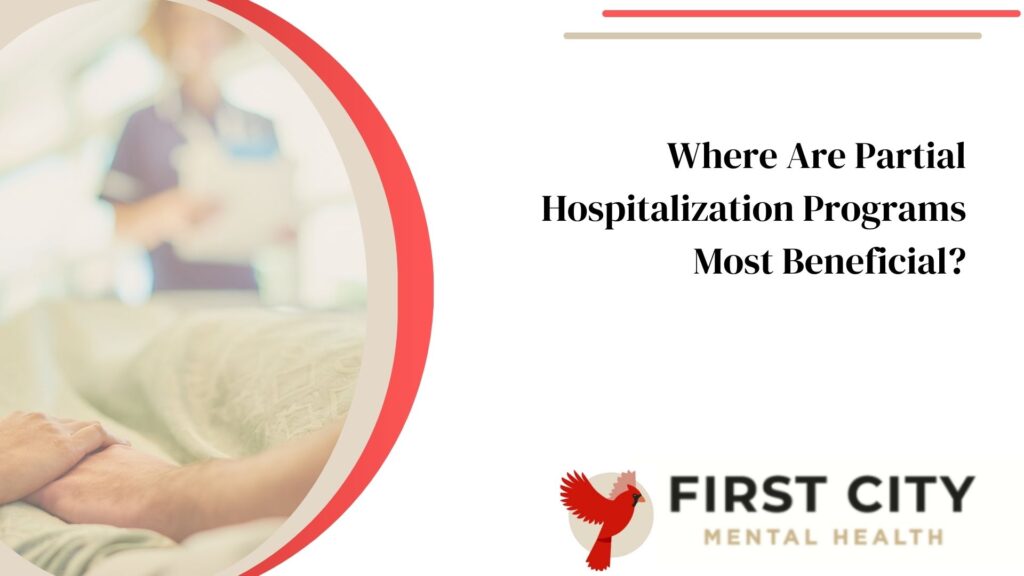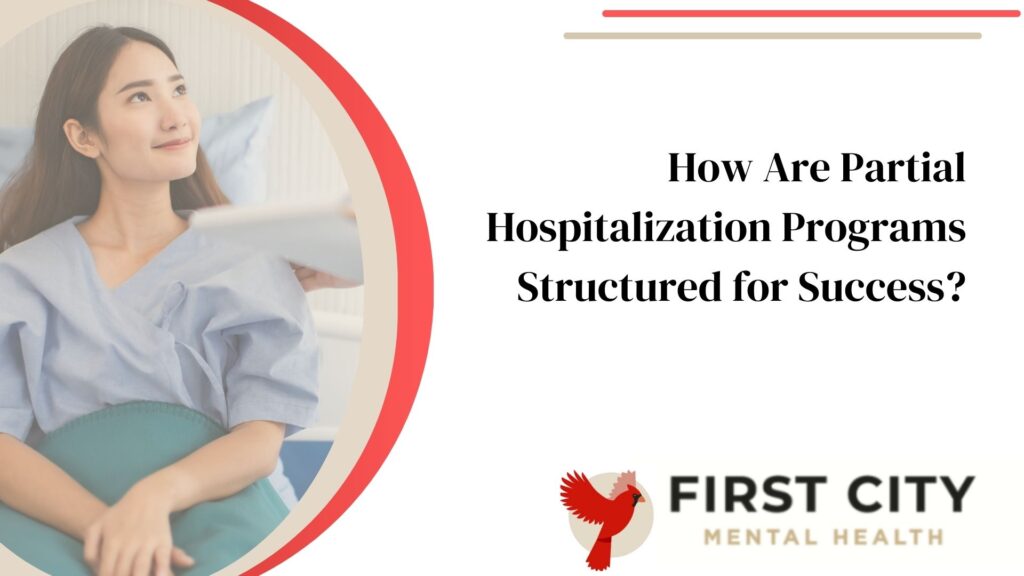
How Intensive Outpatient Indiana Differ from Inpatient Programs?
January 22, 2025
What Is an Adult Intensive Outpatient Program (IOP)?
January 22, 2025Many people feel stuck trying to manage their symptoms while balancing daily responsibilities. The partial hospitalization program offers a solution that provides intensive treatment without requiring a hospital stay.
Partial hospitalization programs (PHP) provide structured support through group and individual therapy, medication management, and life skills training. This can help individuals stabilize their mental health and return to normal functioning.
In this article, we will explore the benefits of partial hospitalization programs. Understanding how PHPs work can help you determine if this treatment option is right for you or your loved one.
Keep reading to learn more about why these programs are effective.
Key Takeaways
- Partial Hospitalization Programs (PHPs) offer structured support through group and individual therapy, medication management, and life skills training to help patients stabilize their mental health without needing an overnight stay in a hospital.
- PHPs provide intensive care for 6-8 hours daily, allowing individuals to continue living at home while receiving necessary treatment. This helps them maintain daily responsibilities like work or school.
- Patients often see results within 30 to 45 days as these programs act as a bridge from residential treatment to outpatient care, aiding in better management of mental health issues and smoother reintegration into society.
What Makes Partial Hospitalization Programs Effective?
Partial Hospitalization Kokomo Programs (PHP) provide intensive care for patients ready to reintegrate into society. They offer more support than outpatient services but less than inpatient treatment.
PHP includes group therapy, individual therapy, medication management, and life skills training. These elements help people stabilize their mental health and return to regular activities.
Group therapy sessions in these programs foster a sense of community among patients. “Feeling understood by others creates hope,” says Dr. Smith, a mental health professional at First City Mental Health in Indiana.
Individual therapy provides focused attention to personal issues, while medication management ensures the correct dosage and effectiveness of prescribed drugs.
Why Are Partial Hospitalization Programs Successful?

Mental Health Partial hospitalization program (PHP) provides immense support for mental health treatment. These programs offer intensive care, including individual and group therapy sessions, medication management, and life skills training.
Patients attend these therapeutic activities 6-8 hours a day without needing to stay overnight. This allows them to continue living at home while receiving structured care. The combination of different therapies helps stabilize mental health conditions and aids in reintegration into society.
PHPs are highly successful because they help patients build daily structure and coping skills quickly. By providing both individual and group therapies, PHP focuses on personal issues and fosters social interactions that are crucial for improving mood disorders or substance use disorders.
For example, the First City Mental Health program emphasizes high levels of patient care aimed at success in everyday life activities like attending school or work without feeling overwhelmed by their mental illness.
When Do Partial Hospitalization Programs Show Results?
Patients usually see results within 30 to 45 days of starting a partial hospitalization program mental health (PHP). These programs act as a bridge from residential to outpatient care, making daily life more manageable.
Participants often begin to manage their mental health better and feel ready to return to work or school.
In this setting, patients gain essential skills without feeling overwhelmed. The structured support helps them reintegrate smoothly into society. Treatment goals are met through planned activities and therapy sessions specially designed for adult patients dealing with various mental health concerns.
Where Are Partial Hospitalization Programs Most Beneficial?

A partial hospitalization program (PHP) is most beneficial for individuals who have completed a residential program. These programs help people reintegrate back into society. They also assist individuals in returning to work or school and managing daily activities without feeling overwhelmed by mental illness.
Offering more intensive treatment, PHPs support those not ready for standard outpatient care but no longer need inpatient hospitalization. This setting allows participants to attend therapy sessions during the day while still living at home, providing crucial stability and structure.
How Do Partial Hospitalization Programs Improve Mental Health?
People often find Indiana partial hospitalization programs (PHP) very helpful for mental health. In Indiana, these programs provide a structured environment like those at First City Mental Health in Kokomo.
Patients receive therapy and medication management daily. The program typically lasts 6-8 hours and offers both group and individual therapy sessions.
Through PHPs, adults can learn skills to manage their mental health better. They gain life skills for independent living while still having support from a care team. This helps them return to work or school and handle daily activities without feeling overwhelmed by their illness.
Many patients experience significant improvement in their well-being and social functioning by regularly participating in the treatments offered at PHPs.
Why Choose Partial Hospitalization Over Other Treatments?
Partial Hospitalization Programs (PHP) are the middle ground between inpatient care and outpatient services. Unlike outpatient programs, PHP provides intensive care with 6-8 hours of daily therapeutic programming.
Patients engage in group therapy, individual therapy, and life skills reintegration. This structured approach helps stabilize mental health while allowing patients to live off-site in community or sober housing.
This balance makes partial hospitalization ideal for those who have completed residential treatment but still need support. It allows patients to start working or attending school while continuing their recovery.
The program’s intensive structure ensures that individuals receive the necessary care without the confinement of complete inpatient programs.
When Is a Partial Hospitalization Program the Right Choice?
An adult Partial Hospitalization Program (PHP) suits those stepping down from residential care to outpatient support. It serves patients ready to reintegrate into society. People can live at home while attending intensive treatment at the center.
PHP is ideal for individuals who need more structure than traditional outpatient care but do not require 24-hour supervision.
Those struggling with mental health issues, such as eating disorders or severe anxiety, benefit significantly from PHPs. These programs provide therapeutic programming, group psychotherapy, and medication management.
Patients can return to work or attend school while receiving the care and skill-building support they need to live independently.
How Are Partial Hospitalization Programs Structured for Success?

Partial hospitalization program in Indiana (PHP) is designed to offer comprehensive mental health care. They combine various therapies and supports to help patients stabilize and regain control.
- Therapeutic Programming: Patients engage in structured activities for 6-8 hours daily, providing intensive care similar to residential programs.
- Group Therapy Sessions: These sessions allow patients to share experiences and support each other, which can foster a sense of community and understanding.
- Individual Therapy: One-on-one sessions help address personal issues and tailor treatment plans to individual needs.
- Medication Management: Doctors or psychiatrists monitor medications closely, adjusting them to maximize their effectiveness.
- Life Skills Reintegration: Programs include training in essential skills like budgeting, cooking, or stress management, helping patients handle daily life tasks effectively.
- Continued Living at Home: Patients live at home during treatment, allowing them to practice new skills in their real-world environment.
- Step-Down Support: After completing more intensive treatments, PHP serves as a transition phase back into everyday life while offering significant support.
- Use of Evidence-Based Therapies: Techniques such as dialectical behavioral therapy (D.B.T.) are employed to ensure the best possible outcomes for mental health improvement.
Conclusion
A partial hospitalization program offers structured support. They help people stabilize their mental health. Patients get therapy and medication management daily. These programs are less intense than inpatient care but more supportive than outpatient services.
Many patients can stay at home while getting the treatment they need. This balance makes a big difference in recovery and independence.
F.A.Q.s
What is a partial hospitalization program?
A partial hospitalization program (PHP) is a mental health treatment program where patients receive intensive therapy while living at home.
Why choose a partial hospitalization program in Indiana?
Indiana’s partial hospitalization programs offer structured care and skill-building for adults, ensuring effective mental health treatment.
How are the costs of a PHP covered?
Program costs can be covered by insurance companies, Medicare, or out-of-pocket payments, depending on your coverage plan.
What requirements must be met to participate in a PHP?
To join an adult partial hospitalization program, participants must meet certain requirements set by the treatment center and their insurance company.
Can family members get involved in the treatment process?
Yes, family members often play an essential role in supporting patients during their time in the mental health partial hospitalization program.






